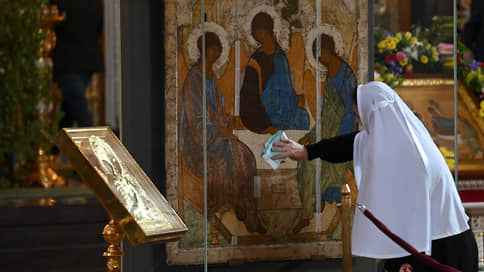Holy place is not private
[ad_1]

State Duma deputies submitted amendments to the laws regulating the transfer of religious property to parliament. The authors of the initiative want to recognize as null and void all transactions made since 2010 on the transfer of property of religious conversion into private hands and “return it to state property.” Representatives of the museum community are worried that the bill could jeopardize the activities of private collectors and museums of iconography.
A federal law to reclaim former church property was passed in November 2010. At that time, parliamentarians secured the right to transfer state or municipal property for religious purposes exclusively to the jurisdiction of religious organizations. Initially, the document caused a protest from museum workers. In particular, opponents of the initiative feared that the state and society would thus lose a large number of cultural monuments. Experts insisted that not a single Orthodox church is able to ensure the proper storage of icons and frescoes, and the Public Chamber of Russia also supported them. However, a compromise was then found: the new version of the bill banned the transfer of religious property, which is part of the Museum Fund of Russia, the Archival Fund of Russia and the National Library Fund.
The other day it became known that new amendments were made to the State Duma, correcting the current legislation in this area. The head of the State Duma Committee on Property, Land and Property Relations, Sergei Gavrilov, says that it is planned to make changes not to the law itself “On the transfer of state or municipal property to religious organizations for religious purposes,” but to Art. 3 of the Federal Law “On the privatization of state and municipal property” and Art. 21 of the Federal Law “On freedom of conscience and on religious associations”. In Russian legislation, the author of the amendments, Mr. Gavrilov, believes (together with him, the document was introduced by the deputy chairmen of the State Duma Vladislav Davankov, Anna Kuznetsova, Pyotr Tolstoy and the head of the LDPR faction, Leonid Slutsky), it is necessary to consolidate the provision on the nullity of transactions made after the adoption of the law on the transfer of religious property to 2010. “In order to eliminate inconsistencies in law enforcement, our draft law establishes in a number of laws a clear provision on the nullity of any transactions aimed at alienating such property in favor of not religious organizations, but private owners,” Sergey Gavrilov specified.
The deputy assured Kommersant that the changes were not related to the previous and ongoing disputes between the museum community and religious organizations (mainly the Russian Orthodox Church) about who should own certain objects of religious worship recognized as historical heritage. “Our goal is to protect religious property from being transferred to private hands and thereby avoid using it for purposes, for example, opening a restaurant or a cinema hall in a church building or even demolishing a church to free up land for construction — such actions offend parishioners,” the deputy comments. — There were situations when private entrepreneurs, after acquiring a church into private ownership, donated it to the church, for example, as was the case with the ancient church of the Great Martyr Demetrius of Thessalonica in the Tula region. But most often the entrepreneur is interested in profiting from the acquired property: the Church of the Nativity of the Virgin on Chistye Prudy in the Tver region is used as a cinema, it was planned to open a hotel in it; The Nikolsky Old Believer Church of the Nikolo-Rogozhskaya Community of Old Orthodox Christians on Malaya Andronievskaya Street has become an office building.
Among other innovations is a ban on the privatization of not only religious buildings, but also valuable items intended for worship, in particular icons. This revision looks especially significant against the background of the public discussion that has unfolded these days around the transfer of Andrei Rublev’s icon “Trinity” to the Cathedral of Christ the Savior. However, Mr. Gavrilov emphasized here that the short story had nothing to do with these events. “Trinity” belongs to the State Tretyakov Gallery, and not to private individuals, which means that this situation is not the subject of regulation of this document.
Representatives of the museum community did not indicate their position on possible innovations. Director of the State Hermitage Museum Mikhail Piotrovsky told Kommersant that he had “no comments” on the legislative initiative. It was not possible to receive answers from the management of the State Historical Museum and the Tretyakov Gallery at the time of publication.
Alexander Preobrazhensky, Candidate of Art History, Associate Professor of the Faculty of History of Moscow State University, expressed concern that the amendments prohibiting the privatization of religious objects could threaten the practice of private collection of icons: arts.” According to the art historian, “this completely legitimate mission should not be called into question.”
[ad_2]
Source link








